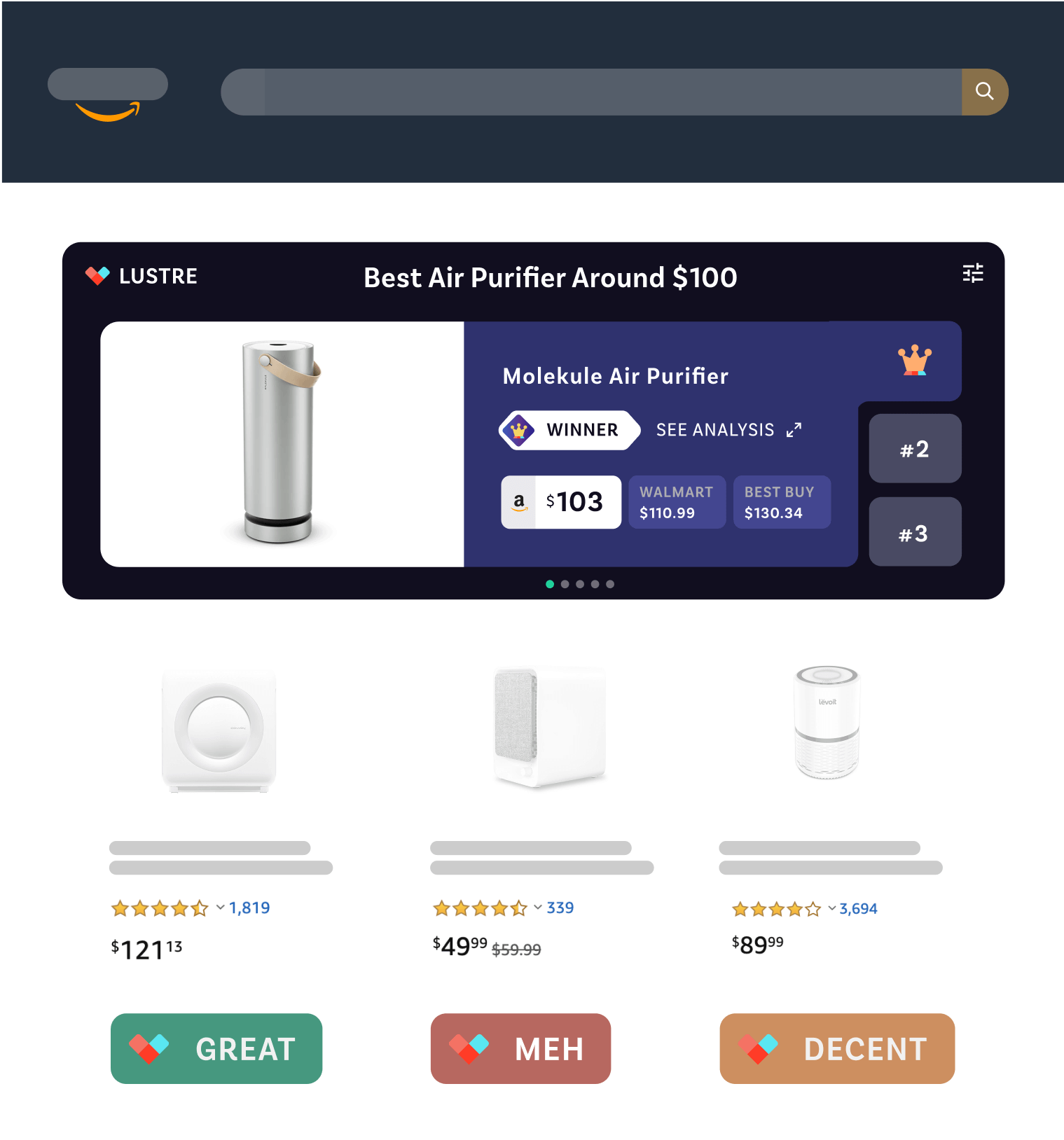Vetted, the startup formerly known as Lustre, today announced that it secured $15 million to fund development of its AI-powered platform for product reviews. The cash infusion comes as part of a Series A led by Insight Partners, with participation from Index Ventures, Bling Capital, Golden Ventures and angels including former Meta VP of commerce Shiva Rajaraman, and founder and CEO Stuart Kearney tells TechCrunch that it’ll be invested in scaling Vetted’s machine learning technologies.
Kearney describes Vetted’s platform, which launched broadly today, as a “product search engine” for “discovering the brands and products most recommended for your needs. He started the company with Tim Etler and Tom Raleigh after a stint working on “smallsats” (spacecraft about the size of a kitchen fridge) at the NASA Ames Research Center and as a systems engineer at the Australian Department of Defense.
“We founded Vetted because we felt that shopping online has become an overwhelming and frankly anti-consumer experience,” Kearney told TechCrunch via email. “People shouldn’t have to spend hours sifting through indistinguishable products littered across thousands of ad-infested sites loaded with fake reviews and unreliable information.”
Vetted surfaces reviews for a given product from The New York Times’ Wirecutter, Reddit, YouTube and other “reputable” sites, according to Kearney (although some might argue that Reddit doesn’t always meet that criterion). Available on the web or as a Chrome extension, the platform compares prices across merchants, tracks changes and delivers alerts when there’s a sale.

Image Credits: Vetted
There’s plenty of product comparison tools out there, like PayPal-owned Honey and Paribus (now Capital One Shopping). But what sets Vetted apart is its use of AI to identify the top products in different categories, Kearney says. Vetted ranks products based on more than 10,000 factors, including reviewer credibility, brand reliability, enthusiast consensus and how past generations performed. As prices change and new products and reviews appear, the platform updates the rankings while a team of 30 “product experts” work to make sure the results are accurate.
“We’ve built our own named entity recognition technology to identify mentions of brands and products. We then analyze the users’ sentiment towards them and use vectorization techniques to group together similar products to do further analysis,” Kearney said. “This enables us to transform the mess of thousands of threads into a well-organized summary of, for example, Reddit’s opinion on a given product or brand.”
Kearney wasn’t forthcoming about how Vetted’s ranking algorithm weighs the various factors and quantifies the more subjective aspects of product reviews, like “credibility.” He also didn’t disclose what work, if any, has been done behind the scenes to ensure Vetted analyzes reviews from different groups of people equally. AI models trained to understand a particular vernacular (e.g. standard English) tend to do poorly when exposed to unfamiliar text.
Kearney says that part of new the funding will go toward deploying more advanced search technologies, as well as AI systems to organize and understand product knowledge in forums. He notes that shoppers who used Vetted before the rebrand (when it was Lustre) ended up buying one of the platform’s suggestions 70% of the time, implying that they trusted Vetted’s recommendations.
“As ecommerce has grown and platforms like Shopify have made it incredibly easy for anyone to launch brands, the number of products people have to choose between has exploded and become fragmented over thousands of stores. This created a massive discovery problem which fueled equally massive ad spend on Amazon, Google, and Facebook to attempt to reach the consumer,” Kearney continued. “As a result, a product’s success has far more to do with how much the brand can afford to spend on ads rather than its quality or value for money. In order to best serve the consumer, ecommerce desperately needs a new solution that aggregates products and knowledge without being gated behind ad spend (the cost of which is directly passed to the consumer).”

Image Credits: Vetted
So, how does Vetted plan to make money? Affiliate links to storefronts are one way. The rest is still being sussed out, but Kearney was adamant that Vetted won’t look to monetize the personally identifiable data the platform collects. “The only data we do collect are completely anonymized, aggregated, and related to general search performance to ensure we’re being helpful to our users,” he said.
When asked about the economic climate and whether it might impact business, Kearney didn’t express any concerns. With more than 330,000 users on Vetted, many of whom joined before the rebrand, he says that the company has “years” of runway and plans to expand its headcount by 30% in the next few months.
“As the economic downturn may cause money to get tighter, we believe Vetted will become an even more powerful way for people to stretch their dollar without the burden of endless research,” Kearney said. “Our primary competitors are people’s existing habits for shopping online, such as Googling ‘best [blank’] and spending hours poring over all the reviews and comparing products.”















 English (US) ·
English (US) ·